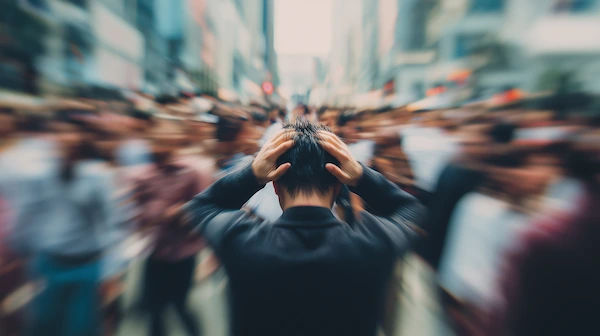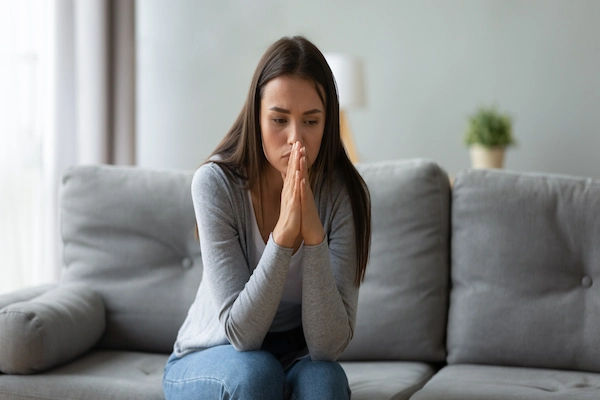Guide to Tips To Manage Stress And Anxiety
Discover 10 powerful, natural strategies to manage stress and anxiety. Learn lifestyle shifts, quick calming techniques, and mental strategies to reclaim calm and resilience.


Introduction
Feeling overwhelmed, constantly worried, or emotionally drained? You're far from alone. In today's fast-paced world, stress and anxiety have become common experiences, impacting millions of people. While a certain level of stress is a normal part of life, chronic, unmanaged stress can spill over into anxiety, affecting your sleep, health, and overall happiness. The good news is that you are not powerless. This guide provides a comprehensive toolkit of practical, evidence-based strategies to help you understand, manage, and reduce your stress and anxiety. We'll explore everything from quick in-the-moment techniques to foundational lifestyle changes that build long-term resilience, empowering you to reclaim a sense of calm and control.
Understanding Your Stress and Anxiety
Before we dive into solutions, it’s helpful to understand what we’re dealing with. Recognising the signs is the first step
toward effective management.
What’s the Difference Between Stress and Anxiety?
While often used interchangeably, stress and anxiety have distinct differences. Stress is typically a response to an
external trigger (a work deadline, a financial problem, an argument) and usually subsides once the situation is resolved.
Anxiety, on the other hand, is defined by persistent, excessive worry that doesn’t go away even in the absence of a stressor. It’s the body's internal reaction to stress. Think of it this way: stress is the result of a work presentation tomorrow, while anxiety is the lingering fear of presentations that persists for weeks.
Common Symptoms: Are You Experiencing These?
Both conditions manifest in similar ways, affecting you physically, emotionally, and cognitively. Common symptoms of
anxiety and stress include:
- Physical: Rapid heart rate, muscle tension, headaches, fatigue, stomach upset, changes in appetite.
- Emotional: Feelings of dread, irritability, restlessness, feeling overwhelmed or "on edge."
- Cognitive: Constant worrying, racing thoughts, difficulty concentrating, forgetfulness.
Foundational Lifestyle Shifts for Long-Term Resilience
Building a strong foundation is crucial for managing stress and anxiety proactively. These pillars support your entire nervous system.
Prioritise Quality Sleep for Mental Recharge
Sleep and mental health are deeply intertwined. Lack of sleep can exacerbate anxiety, and anxiety can make it hard to
sleep, creating a vicious cycle. Aim for 7-9 hours of quality sleep per night. Establish a relaxing bedtime routine:
- Power down screens an hour before bed
- Keep your room cool and dark
- Avoid caffeine in the afternoon and evening
Quality sleep acts as a reset button for your brain, improving emotional regulation and resilience.
Nourish Your Body: The Gut-Brain Connection
Emerging research continues to highlight the "gut-brain axis," showing that what you eat directly impacts how you feel.
A diet high in processed foods, sugar, and unhealthy fats can worsen stress and anxiety symptoms. Instead, focus on:
- Complex Carbohydrates: (e.g., whole oats, quinoa) which help regulate serotonin, a mood-stabilising neurotransmitter.
- Omega-3 Fatty Acids: (e.g., fatty fish, walnuts, flaxseeds) known for their anti-inflammatory and brain-health benefits.
- Probiotics and Prebiotics: (e.g., yoghurt, kefir, garlic, onions) to support a healthy gut microbiome, which is linked to
reduced anxiety. - Limiting Stimulants: Reduce caffeine and alcohol, as they can trigger panic attacks and worsen anxiety.
Move Your Body: How Exercise Acts as Natural Medicine
Physical activity for stress relief is one of the most effective, underutilised strategies. Exercise is a natural anxiety
reducer because it:
- Releases endorphins, your body's natural painkillers and mood elevators
- Lowers stress hormones like cortisol and adrenaline
- Provides a healthy distraction from cyclical worries
You don’t need to run a marathon. A daily 30-minute brisk walk, a yoga session, dancing in your living room, or
gardening can produce significant benefits.
In-the-Moment Techniques to Calm Your Nervous System
When anxiety attacks hit or stress feels overwhelming, these techniques can provide immediate relief.
Master Your Breath: The Quickest Path to Calm
Your breath is a powerful tool you always have with you. When anxious, breathing becomes shallow and rapid,
signalling danger to your nervous system. Deep, diaphragmatic breathing reverses this signal.
The 4-7-8 Technique:
- Inhale quietly through your nose for 4 seconds
- Hold your breath for 7 seconds
- Exhale completely through your mouth for 8 seconds
- Repeat 3-4 times
This is a highly effective method for how to calm down quickly.
Practise Mindfulness and Grounding Exercises
Mindfulness is the practice of anchoring yourself in the present moment without judgement. It stops the cycle of
worrying about the future or ruminating on the past.
Consult a Psychologist for the best advice
The 5-4-3-2-1 Grounding Technique:
- Acknowledge 5 things you can see
- 4 things you can feel
- 3 things you can hear
- 2 things you can smell
- 1 thing you can taste
This forces your brain to engage with your immediate environment, breaking the cycle of anxious thoughts.
Mental and Emotional Management Strategies
Managing your internal narrative is key to long-term control over stress and anxiety.
Challenge Negative Thought Patterns
Anxiety is often fueled by cognitive distortions—unhelpful thinking patterns like catastrophising (assuming the worst) or
black-and-white thinking. Practise identifying these thoughts and challenging them. Ask yourself:
- "Is this thought based on fact or fear?"
- "What is a more balanced way to view this situation?"
This is a core principle of Cognitive Behavioural Therapy (CBT), a highly effective treatment for anxiety.
The Power of “No”: Setting Healthy Boundaries
Chronic stress is often a product of overcommitment—saying "yes" when we mean "no." Learning to set healthy
boundaries at work and in personal relationships is not selfish; it’s essential for self-preservation. It protects your time,
energy, and emotional well-being, preventing resentment and burnout.
Building a Support System and Knowing When to Get Help
You don’t have to manage everything on your own. Connection is a powerful antidote to stress.
Connect with Others: You Don’t Have to Go It Alone
Talking to a trusted friend, family member, or partner about what you’re going through can provide immense relief.
Simply verbalising your feelings can make them feel less powerful and isolating. Consider joining a support group where
you can connect with others who understand your experience.
Recognising When to Seek Professional Support
Self-help strategies are powerful, but sometimes professional help for anxiety is necessary. If your anxiety and stress feel
unmanageable, interfere with your daily life (work, relationships, self-care), or persist beyond two weeks, it’s crucial to
consult a professional. A therapist can provide tools like CBT, and a doctor can rule out any underlying medical
conditions. If your condition does not improve after trying these methods, consult a doctor online with Apollo24|7 for further evaluation and to discuss a personalised treatment plan.
Conclusion
Managing stress and anxiety is not about eliminating them completely—that’s an unrealistic goal. Instead, it's about
building a robust toolkit of strategies and a resilient mindset that allows you to navigate life's challenges with greater ease and less distress. By incorporating these foundational lifestyle changes, in-the-moment techniques, and mental reframing strategies, you empower yourself to break the cycle of worry and reclaim a sense of peace. Remember, this is a journey, not a destination. Be patient and compassionate with yourself as you experiment to find what works best for you. Start with one or two tips that resonate most, and gradually build from there. Your mental well-being is worth the investment.
Consult a Psychologist for the best advice
Consult a Psychologist for the best advice

Ms Rajashree Navthale
Psychotherapy & Counselling (ASM)
8 Years • MA in Counselling & Psychotherapy, PG Diploma in Counselling & Psychotherapy.
Akola
Connect Counselor, Akola

Miss. Vaishnavi Sankeshwar
Psychologist
5 Years • Msc Clinical Psychology
Bengaluru
Apollo Clinic, JP nagar, Bengaluru

Ms. Meenu Sharma
Psychologist
11 Years • PhD (Applied Psychology), MA (Applied Psychology),PG Diploma in Rehabilitation Psychology
Noida
Dr Meenu Sharma Clinic, Noida
(75+ Patients)

Ms. Gunjan Arya
Psychologist
4 Years • MA Psychology
Delhi
Psych Therapy By Gunjan Arya, Delhi

Ms. Monalisa Kha Bhaduri
Psychologist
12 Years • MA Psychology
Kolkata
Ms Monalisa Kha Bhaduri's Clinic, Kolkata
(250+ Patients)
Consult a Psychologist for the best advice

Ms Rajashree Navthale
Psychotherapy & Counselling (ASM)
8 Years • MA in Counselling & Psychotherapy, PG Diploma in Counselling & Psychotherapy.
Akola
Connect Counselor, Akola

Miss. Vaishnavi Sankeshwar
Psychologist
5 Years • Msc Clinical Psychology
Bengaluru
Apollo Clinic, JP nagar, Bengaluru

Ms. Meenu Sharma
Psychologist
11 Years • PhD (Applied Psychology), MA (Applied Psychology),PG Diploma in Rehabilitation Psychology
Noida
Dr Meenu Sharma Clinic, Noida
(75+ Patients)

Ms. Gunjan Arya
Psychologist
4 Years • MA Psychology
Delhi
Psych Therapy By Gunjan Arya, Delhi

Ms. Monalisa Kha Bhaduri
Psychologist
12 Years • MA Psychology
Kolkata
Ms Monalisa Kha Bhaduri's Clinic, Kolkata
(250+ Patients)
More articles from Anxiety disorders
Frequently Asked Questions
1. What is the fastest way to reduce anxiety?
The fastest way is often to use a breathing technique like the 4-7-8 method or a grounding exercise like the 5-4-3-2-1 technique. These work by directly calming your nervous system and pulling your focus away from anxious thoughts.
2. Can diet really affect anxiety levels?
Absolutely. The gut-brain connection is well-established. A diet high in sugar and processed foods can cause blood sugar spikes and inflammation, worsening anxiety. A balanced diet rich in whole foods, omega-3s, and probiotics supports a stable mood and reduces symptoms of anxiety.
3. What is the difference between an anxiety attack and a panic attack?
Anxiety attacks often build gradually in response to a perceived threat and can be less intense. Panic attacks are sudden, intense surges of fear or discomfort that peak within minutes, often with severe physical symptoms like a racing heart, sweating, and feeling like you’re choking or having a heart attack.
4. When should I see a doctor about my anxiety?
You should consider seeking professional support if your anxiety is constant, difficult to control, interferes with your daily responsibilities, causes you to avoid places or situations, or has persisted for more than two weeks. A doctor can help rule out other causes and discuss treatment options.
5. Are there any vitamins or supplements that help with stress?
Some studies suggest that magnesium, omega-3 fatty acids, vitamin D, and B vitamins can support the nervous system and mood regulation. However, it's important to talk to a doctor before starting any new supplement regimen. Apollo24|7 offers convenient home collection for tests like vitamin D or HbA1c to check if you have any deficiencies.




